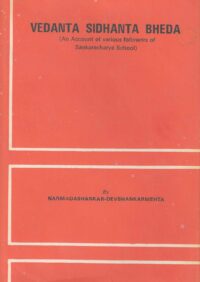Vedanta Sidhanta Bheda
By Narmadashankar-Devshankarmehta.
125 Pages | Published in 1985 | Hardcover | S.N. Publications | No ISBN.
An Account of Followers of the Sankarācārya School.
The book deals with the doctrinal differences among various followers of Sankarācārya School - the component of Advaita metaphysics. The study is divided into four Chapters based upon the four headings under which the subject matter of Vedānta naturally falls. Chapter I deals with Categories of Vedānta Brahma, Māyā, Jiva and Jagat, Chapter 2 reviews the harmony of Physics and Metaphysics. Chapter 3 recounts the means of realizing Brahman. Chapter analyses the theory liberation - the ultimate aim of man's existence.
The book is systematically arranged. Each chapter is divided into sections and subsections, indicative of differences of the ācāryas in regard to their respective doctrines. The work is based upon the Siddhantalesa of Appaya Diksita. Other works have also been consulted and the results obtained. The author has taken care to avoid personal reflections on the Comparative merits of various doctrinal differences. The upholders of differences are allowed to speak in their own words, rendered into English, so that the reader might impartially grasp their views.
From the Introductory Remarks (p. VII):
" 'Know Thyself' is the ultimate appeal of all the orthodox and heterodox systems of Indian Philosophy. Inquiry into the Nature of Self was a stirring principle in the Indian soil, which has put to motion all the reflective minds from ancient times. The great cosmological hymn of the Rigveda, which is so much celebrated for the loftiness and uniqueness of its thought is one of the so many links of a long chain of philosophical Compositions of the pre-Rigvedic Aryas, which have survived the lapse of 3.000 years. The Rigveda - the most ancient repository of Indian thought and culture - presents a grave picture of a Rishi relflecting upon the cause of the universe and the problems of life. His speculations will, no doubt, excite the sneer of a matter-of-fact man of the nineteenth century. But a man, who cares to discern the beauty of ancient literature, should follow the sound piece of advice given by Hume: 'Nor is it ever permitted to judge of the civility or Wisdom of any people, or even single persons, by the grossness or refinement of their theological principles. On this account, all the absurdities of the pagan system of theology must be overlooked by every critic, who would pretend to form a just notion ancient poetry'. Thus, there is no wonder when one Rishi says, that the universe is born of the great golden egg. "
 Bezig met bijwerken...
Bezig met bijwerken...